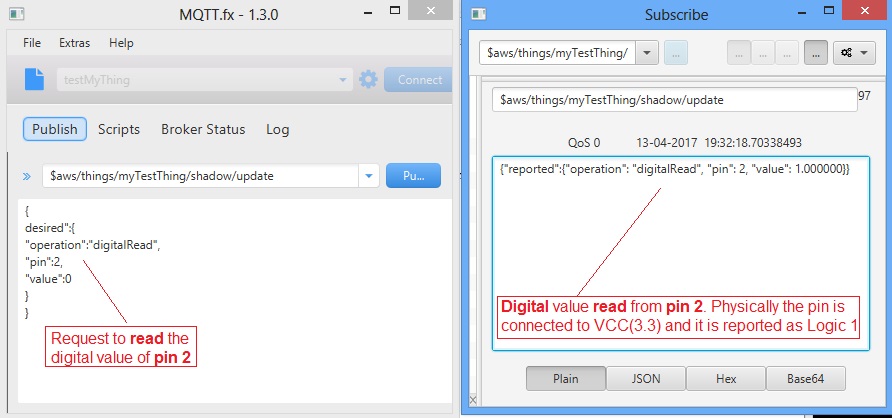Difference between revisions of "Hornbill ESP32 IO Control"
| Line 82: | Line 82: | ||
==digitalRead== | ==digitalRead== | ||
| + | [[File:DigitalReadTest.jpg]] | ||
==digitalWrite== | ==digitalWrite== | ||
Latest revision as of 19:39, 13 April 2017
In the last tutorial we saw how to use the Arduino ESP32 AWS IOT library to configure an AWS client to subscribe/publish to a topic/thing. At the end of the tutorial we logged the temperature and humidity using DTH11 sensor.
Contents
Hornbill IO operation
In this tutorial we will see how to control the ESP32 pins using the AWS IOT. For this we will be using the Hornbill_IO library. Hornbill_IO library currently supports the below four operation which will be extended in the near future.
- digitalRead
- digitalWrite
- analogRead
- analogWrite
Hornbill IO JSON Format
We have a specific protocol/json format defined for the IO operation. Below is the Json format for sending the data from Control Unit to ESP32 for writing a logic 1 to pin 13.
Below is the Json format for reporting the data from ESP32 to Server. The device is reporting the analog value(1023) of pin 36 to the server. .
Hornbill IO Structure
The above Json format is mapped to internal Hornbill IO control structure as below. This may change in the future as we add more functionality to Hornbill IO library.
Hornbill IO Functions
| Function | int parseRequest(char *json_string, hornbill_IO_type_t *ioReq); |
|---|---|
| description | This function parses the input string and extract the requested operation, pinNum , value and copies them to I/p structure pointer. |
| Arguments |
|
| returns |
|
| Function | int processRequest(hornbill_IO_type_t *ioReq) |
|---|---|
| description | This function handles the requested IO operation. In case of read it reads the pin and stores its value which can be reported back. |
| Arguments | hornbill_IO_type_t *ioReq--> Structure pointer containing the requested operation , pinNum and its value |
| returns |
TDB |
| Function | void createPayload(char *payload_ptr, hornbill_IO_type_t *ioReq) |
|---|---|
| description | This function is used to create a reporting payload by using the information passed in the structure(operation, pinNum and value) |
| Arguments | hornbill_IO_type_t *ioReq--> Structure pointer containing the reporting information (operation , pinNum and its value) |
| returns |
void |
Code

